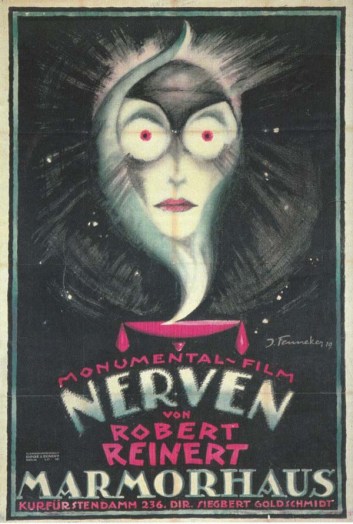NERVES (1919 )[“Nerven”- original title]
Director/ Writer/ Producer: Robert Reinert
Cinematography: Helmar Lerski
Score: Joachim Bärenz
Starring: Eduard von Winterstein/ Lia Borré/ Erna Morena/ Paul Bender/ Lili Dominici/ Rio Ellbon.
Is there such a thing as too Expressionistic? Well some of the audience at the premiere of the epic German production Nerven (Nerves) by director Robert Reinert in Munich in 1919, seemed to think so. Here’s what Wikipedia has to say about Reinert’s depiction of a “nervous epidemic” sweeping the nation, and in particular, its effect on one family of industrialists:
“Nerven opened in Munich in 1919. People were hospitalized after watching the movie and one woman, after seeing it, woke up one night, went out on the street in her nightshirt and screamed ‘Now I am going to die! Now I am going to die!’ About Nerven, one recent critic wrote ‘Nerven is a disorienting, highly experimental work. Released in 1919, before The Cabinet of Dr. Caligari (early 1920), it might have become a prototype of German Expressionist cinema if it had been widely seen.’ Reinert’s films were not a commercial success, and in 1925 he got a job with UFA, where he worked until his death of a heart attack in 1928”

Robert Reinert’s 1919 movie, Nerves (“Nerven”, original title) opening sequence with half naked young men and graphic violence had some female members of the audience in Munich theatres hospitalized.
It certainly touched a nerve or two with that particular member of the audience. The German Wikipedia also describes how several ‘Münchners’ were driven to insanity after watching the film and eventually the Chief of Police was called to intervene. And not surprising since the film shows extremely graphic imagery of dozens of young German soldiers dying slow and painfully, all piled atop each other in a corpse-ridden battlefield. And all this so soon after the war; it’s no wonder that some mothers in the audience were traumatized. The timing for the release of the film was a little off, to say the least. However I’m pretty sure the producers gloated at the film’s effect on the audience, and used this as a promotional ploy to entice the public into the shocking new world of Expressionist cinema.
It’s easy to imagine, in 1919, Nerven having high appeal to the artistic young followers of the increasingly popular Expressionist cinema á la mode. With highly graphic and stylized imagery, expensively designed sets, full frontal nudity and the usual intellectual themes of despair, insanity, paranoia, and social unrest, it’s no wonder it was described as a ‘prototype’ for future German Expressionist films. Yet above all the visually pleasing aesthetics, it’s the emotionally charged story-line that is most heart wrenching:
“This unique portrait of the life in 1919 Germany,describes people from all levels of society: Factory owner Roloff who looses his mind in view of catastrophies and social disturbances, teacher John who is the hero of the masses and Marja who turns into a radical revolutionary.Released shortly before The Cabinet of Dr. Caligari, Nerven ought to have entered the Expressionist canon. Its themes echo the movement’s post-Romantic attack on capitalism and the modern conception of the anguished soul.”
—David Bordwell (Edition Filmmuseum)
As well as also directing the highly controversial ‘Opium’ (1919), starring Conrad Veidt, Robert Reinert also wrote the screenplay for the über visionary, 6-part epic ‘Homunculus’. A sci-fi horror about artificial life, in the same vein as Metropolis, Der Golem and Frankenstein. If his work is a reflection of his personality, then Reinert must have been an incredibly complex and intense person, and it’s no wonder the poor guy’s heart gave out in the end. Below is a link to good restoration of Nerven. The subtitles are not well translated, but this shouldn’t detract from your enjoyment. But be warned, it’s not for the faint-hearted!
Video link working as of 02/01/15:


